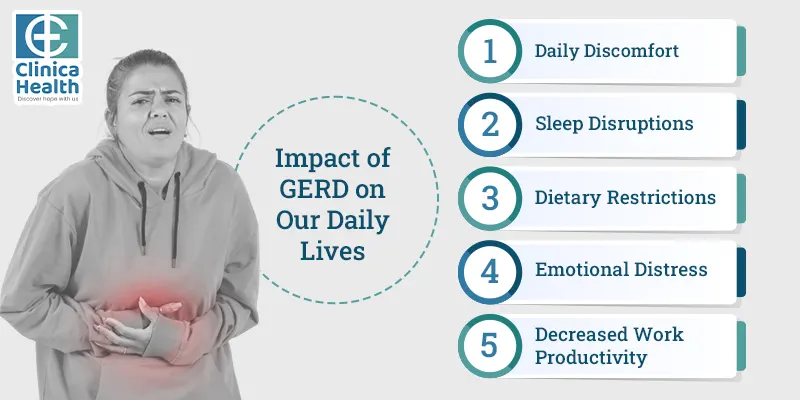How GERD Affects Your Daily Life
Are you facing constant heartburn? Well, this could be a sign of a serious condition called GERD. Gastroesophageal reflux disease is more than just acid reflux.
While acid reflux is common among individuals, causing heartburn, GERD is a chronic condition when the acid reflux occurs persistently, leading to potential damage to the esophagus over time.
Why does GERD occur?
GERD occurs due to an impaired valve mechanism between the swallowing tube (esophagus) and the stomach. When the lower esophageal sphincter (LES) does not close or relax at the right time, it causes the stomach’s acidic content to flow back into the esophagus. Frequent coming back of the stomach’s content (both acidic and digestive enzymes and food) irritates and damages the esopohageal lining. In this case, GERD treatment surgery offers a permanent solution by strengthening the LES and preventing the flow of stomach content.
Symptoms of GERD
The following are the symptoms of GERD that most people experience:
- Acid regurgitation
- Heartburn
- Chronic cough
- Nausea and vomiting
- Bloating and burping
- Hoarseness or sore throat
- Chest pain
- Abdominal pain
- Bitter or sour taste in the mouth
- Heartburn
- Difficulty swallowing
The severity of these symptoms might vary among individuals and worsen after eating, bending or lying down.
Impact of GERD on our Daily Lives
For many people, the symptoms of GERD interfere with daily living if left untreated by GERD treatment surgery. Here are the following ways GERD affects our quality of life.
Daily discomfort
One of the noticeable ways GERD impacts our daily lives is the constant discomfort, like heartburn, chest pain and acid regurgitation that occur multiple times a day. These symptoms result in a bitter and sour taste, making eating unpleasant and preventing patients from enjoying meals.
Sleep disruptions
GERD becomes worse when lying down, which disrupts sleep, like shorter sleep duration, difficulty falling asleep, staying awake at night and awakening early in the morning. Poor sleep quality for a long period of time leads to fatigue, mood changes and even depression. Moreover, waking up with a sour taste in the mouth is also common.
Dietary restrictions
To manage GERD, patients are often required to make dietary changes. Spicy foods, caffeine, fried and processed foods, alcohol and fatty items are some of the common triggers for GERD. They are also required to avoid heavy meals. Constant restriction on diet leads to malnutrition, lower energy levels and unexplained weight loss.
Emotional distress
Chronic acid reflux and its associated symptoms take a toll on the emotional health of individuals. Persistent discomfort, disturbed sleep, and dietary restrictions cause anxiety and depression. Some patients even experience difficulty in swallowing, which makes it frustrating for them to attend gatherings.
Decreased work productivity
GERD greatly impacts the work productivity of individuals. Constant chest pain, acid regurgitation and heartburn throughout the day make it difficult for patients to concentrate on work. Hence, most of the reputed surgeons in Kolkata recommend GERD treatment surgery as the permanent solution to get relief from the symptoms and manage the condition effectively.

What are the Physical Complications of GERD?
If GERD is not treated or managed properly, it can lead to serious complications like the following:
Esophageal stricture: Repeated irritation in the lining of the esophagus, resulting in the formation of scar tissue and narrowing of the esophagus. This causes difficulty in swallowing and gastrointestinal bleeding.
Esophagitis: It refers to inflammation and sores in the esophageal lining, causing pain and gastrointestinal bleeding.
Barrett's esophagus: It is a condition where the cells lining the lower part of the esophagus become like those of the intestines.
Esophageal cancer: GERD increases the risk of a fatal condition like cancer, where treatment becomes challenging and complicated.
Is it possible to manage GERD at home?
For many patients with mild symptoms, GERD can be effectively managed with lifestyle modifications like the following:
- Eating smaller meals at frequent intervals instead of a heavy meal.
- Avoid triggers that are causing the GERD
- Not lying down immediately after eating. Make sure to eat or drink three to four hours prior to sleep.
- Elevating the head of the bed or the body with a foam wedge
- Maintaining a healthy weight
- Limiting alcohol consumption and smoking
In some patients, medications like H2-receptor, proton pump inhibitors and prokinetic agents are also prescribed, but they have side effects and do not work for everyone.
Who needs GERD treatment surgery?
When lifestyle changes or medicines do not show any improvements in the symptoms, patients are suggested GERD treatment surgery. Surgical intervention is recommended in the following cases.
- Noncompliance of patients with treatment plans
- Patients suffering from severe esophagitis
- High volume reflux
- Bening stricture resulting from chronic inflammation and scarring of the esophagus
- Barrett’s columnar-lined epithelium
- The age and choice of the patients, considering the adverse effects of medical therapy
How is the Procedure Carried Out?
Nissen fundoplication is the most common GERD treatment surgery. It is carried out using a laparoscope, which is minimally invasive. During the procedure, the top portion of the stomach is wrapped around the lower esophagus. This strengthens the lower esophageal sphincter, thereby preventing acid reflux. The method is completely safe with no such complications.
Moreover, the recovery period is also short, and patients are required to follow strict dietary precautions to ease digestion.
Conclusion
GERD significantly affects the quality of life. However, with the right GERD treatment surgery, patients can get permanent relief from the symptoms. Make sure to consult an experienced surgeon and take the right steps towards taking control of your health.
 Call Now:
8010 552 552
7595 838 844
Call Now:
8010 552 552
7595 838 844
 Whatsapp Now:
8010 552 552
Whatsapp Now:
8010 552 552
 Email Me:
[email protected]
Email Me:
[email protected]

